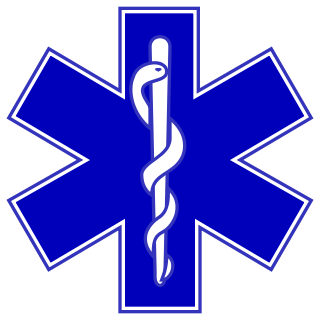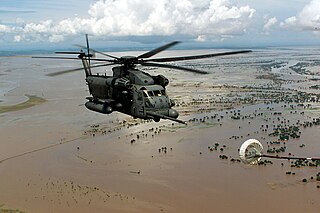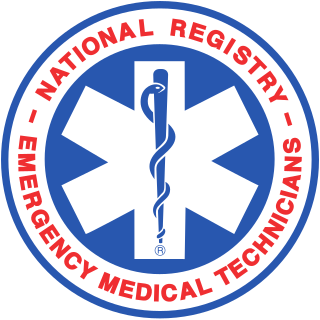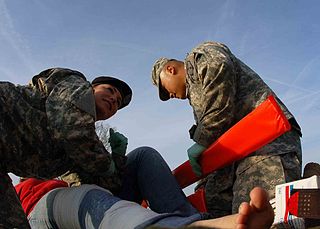Related Research Articles

The World Food Programme (WFP) is an international organization within the United Nations that provides food assistance worldwide. It is the world's largest humanitarian organization and the leading provider of school meals. Founded in 1961, WFP is headquartered in Rome and has offices in 87 countries. In 2023 it supported over 152 million people, and it is present in more than 120 countries and territories.

Emergency medical services (EMS), also known as ambulance services or paramedic services, are emergency services that provide urgent pre-hospital treatment and stabilisation for serious illness and injuries and transport to definitive care. They may also be known as a first aid squad, FAST squad, emergency squad, ambulance squad, ambulance corps, life squad or by other initialisms such as EMAS or EMARS.

An emergency medical technician is a medical professional that provides emergency medical services. EMTs are most commonly found serving on ambulances and in fire departments in the US and Canada, as full-time and some part-time departments require their firefighters to at least be EMT certified.

The International Rescue Committee (IRC) is a global humanitarian aid, relief, and development nongovernmental organization. Founded in 1933 as the International Relief Association, at the request of Albert Einstein, and changing its name in 1942 after amalgamating with the similar Emergency Rescue Committee, the IRC provides emergency aid and long-term assistance to refugees and those displaced by war, persecution, or natural disaster. The IRC is currently working in about 40 countries and 26 U.S. cities where it resettles refugees and helps them become self-sufficient. It focuses mainly on health, education, economic wellbeing, power, and safety.

The 2000 Mozambique flood was a natural disaster that occurred in February and March 2000. The catastrophic flooding was caused by heavy rainfall caused by Cyclone Leon-Eline that lasted for four weeks and made many homeless. Approximately 800 people died, 1400 km2 of arable land was affected and 20,000 head of cattle and food were lost. It was the worst flood in Mozambique in 50 years.

Medical Aid for Palestinians (MAP) is a British charity that offers medical services in the West Bank, Gaza and Lebanon, and advocates for Palestinians' rights to health and dignity. It is in special consultative status with ECOSOC since 2002.

The Directorate-General for European Civil Protection and Humanitarian Aid Operations, formerly known as the European Community Humanitarian Aid Office, is the European Commission's department for overseas humanitarian aid and for civil protection. It aims to save and preserve life, prevent and alleviate human suffering and safeguard the integrity and dignity of populations affected by natural disasters and man-made crises. Since September 2019, Janez Lenarčič is serving as Commissioner for Crisis Management in the Von der leyen commission, and since 1 March 2023, Maciej Popowski leads the organisation as the Director-General.

The European Commissioner for Crisis Management is a member of the European Commission. The portfolio was previously titled Commissioner for Humanitarian Aid and Civil Protection. The post is currently held by Janez Lenarčič.

The National Registry of Emergency Medical Technicians (NREMT) is a US based, non-profit certification organization for pre-hospital emergency medical providers that exists to ensure that every Emergency Medical Technician has the knowledge and skills required for competent practice.

Emergency Medical Responders (EMRs) are people who are specially trained to provide out-of-hospital care in medical emergencies, typically before the arrival of an ambulance. Specifically used, an emergency medical responder is an EMS certification level used to describe a level of EMS provider below that of an emergency medical technician and paramedic. However, the EMR is not intended to replace the roles of such providers and their wide range of specialties.

State Medical Rescue in Poland is a system of free public emergency healthcare established by Ustawa o Państwowym Ratownictwie Medycznym, including ambulance service and Emergency Departments (EDs). While in Polish public hospitals and clinics NFZ common public insurance is required, PRM medical services in ambulances and EDs are completely free for everyone. Since 2018 emergency ambulances that operates in PRM, that is Polish 112 and 999 emergency numbers, are operated by public entities only.
IsraAID is an Israel-based non-governmental organization that responds to emergencies all over the world with targeted humanitarian help. IsraAID was founded by Shachar Zahavi and Mully Dor. This includes disaster relief, from search and rescue to rebuilding communities and schools, to providing aid packages, medical assistance, and post-psychotrauma care. IsraAID has also been involved in emergency response and international development projects in more than 60 countries, with focuses on Water, Sanitation & Hygiene, public health and medical care education, and mental health and protection.
RedR is an international NGO whose stated mission is to “rebuild lives in times of disaster by training, supporting, and providing aid workers to relief programmes across the world.” It was originally an acronym for Register of Engineers for Disaster Relief, although it is no longer used as such.

United Hatzalah is an Israeli volunteer-based emergency medical services (EMS) organization providing free service throughout Israel, with its headquarters based in Jerusalem. Its mission is to provide immediate medical intervention during the critical window between the onset of an emergency and the arrival of traditional ambulance assistance. It is one of many Hatzalah organizations in various parts of the world and the only one that includes women and non-Jewish volunteers.

The Penn Medical Emergency Response Team (MERT) is the University of Pennsylvania's student-run volunteer emergency medical services organization, providing care to students, faculty, staff and community members. MERT's primary responsibility is to provide quick-response emergency medical care before Philadelphia Fire Department paramedic units are available to provide patient transport. The secondary purpose of MERT is to provide education to the Penn community, specifically CPR training, First Aid training, and alcohol education.

This article outlines the defence forces of the European Union (EU), which implement the EU's Common Security and Defence Policy (CSDP) in CSDP missions. There are two categories of EU multinational forces: ones that have been established intergovernmentally and made available to the CSDP through Article 42(3) of the Treaty on European Union (TEU), such as the Eurocorps; and the EU Battlegroups, established at the EU level.
The 2018–2021 Southern Africa drought was a period of drought that took place in Southern Africa. The drought began in late October 2018, and negatively affected food security in the region. In mid-August 2019, the drought was classified as a level 2 Red-Class event by the Global Disaster Alert and Coordination System. The alert level was reduced to the Orange-1.7 by 12 December 2019, as the new wet season had started. In September 2020, the drought was classified as a level 2 Red-Class event. The drought continued into early 2021. Beginning in October 2021, South Africa experienced above average rainfall and reservoirs refilled by early 2022.

Intense Tropical Cyclone Idai was one of the worst tropical cyclones on record to affect Africa and the Southern Hemisphere. The long-lived storm caused catastrophic damage, and a humanitarian crisis in Mozambique, Zimbabwe, and Malawi, leaving more than 1,500 people dead and many more missing. Idai is the deadliest tropical cyclone recorded in the South-West Indian Ocean basin. In the Southern Hemisphere, which includes the Australian, South Pacific, and South Atlantic basins, Idai ranks as the second-deadliest tropical cyclone on record. The only system with a higher death toll is the 1973 Flores cyclone that killed 1,650 off the coast of Indonesia.
During the afternoon of 7 March 2021, a series of four explosions occurred at a military barracks in the neighborhood of Nkoantoma, a district of Bata, Equatorial Guinea. At least 107 people died, and more than 600 others were injured, while significant infrastructural damage also occurred throughout the city.

Many countries allocated relief aid items to southern Africa after Cyclone Freddy, with a main focus on the humanitarian crisis in Malawi. Items included hygiene supplies, food rations, and safe drinking water among other things Total donations reach the millions in USD, and there was also a primary focal point on the historic and ongoing outbreak of Cholera in the region. Several nations also expressed condolences to Malawi, Mozambique, and Madagascar. The widespread and prolonged impacts prompted extensive relief efforts from the affected nations and multiple intergovernmental agencies. UNICEF and the WFP provided relief items for those affected, as well as temporary shelters.
References
- 1 2 "Humanitarian Action". archive.ph. 2021-03-17. Archived from the original on 2021-03-17. Retrieved 2022-06-11.
- 1 2 "Portal Web AECID (Inglés) Emergency response". archive.ph. 2021-03-17. Archived from the original on 2021-03-17. Retrieved 2022-06-11.
- 1 2 3 "START Spanish Technical Aid Response Team: Equipo Médico de Respuesta…". archive.ph. 2021-03-17. Archived from the original on 2021-03-17. Retrieved 2022-06-11.
- 1 2 3 "Crisis del coronavirus: Los 'chalecos rojos' combaten en casa". archive.ph. 2021-03-17. Archived from the original on 2021-03-17. Retrieved 2022-06-11.
- 1 2 "START - Spanish Technical Aid Response Team" (PDF) (in Spanish). Archived from the original (PDF) on 2021-03-17.
- ↑ "La cooperación española atiende ya a los afectados por ciclón en Moza…". archive.ph. 2021-03-17. Archived from the original on 2021-03-17. Retrieved 2022-06-11.
- ↑ "Equipos de España e Israel ayudan en Bata a los damnificados de la ex…". archive.ph. 2021-03-12. Archived from the original on 2021-03-12. Retrieved 2022-06-11.